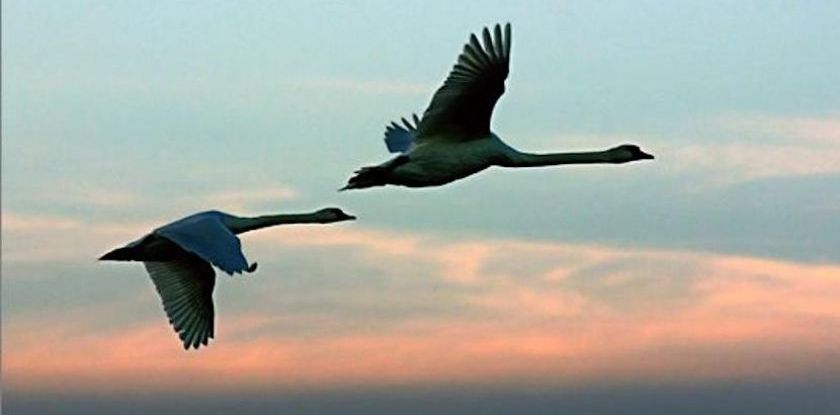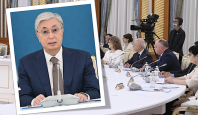On the surface, Kazakhstan looks like a state that is gradually recovering from the January “outburst” of the protests and doing rather well amid the ever-growing confrontation between its military, political and economic ally and the West. However, it only seems that way.
In our opinion, the current situation in the Republic of Kazakhstan can be summed up in two words – fragile balance. On one hand, the ruling elite cannot or perhaps is incapable of offering a new policy to the citizens that will mobilize them to become patriots of their country. On the other hand, most Kazakh citizens are not ready to be proactive and are simply waiting for the situation inside and outside of the country to develop in its own way.
Against this background, the upcoming nationwide referendum of June 5, 2022, on making the “Tokayev” amendments to the Kazakh Constitution has turned into a boring and uninteresting procedure. The Kazakhs will have to endure it one way or another, but it is unlikely to inspire most of the voters to give their support to the second President of Kazakhstan and the reforms he intends to conduct.
In view of this, a legitimate question arises – what is next?
OK, the referendum will take place and, according to our estimates, about 60-80% of the registered voters will take part in it. With that, no less than 97% of the actual voters will vote in favor of the amendments. Then Akorda and Kassym-Jomart Tokayev will celebrate their success regardless of how real it is. But what will happen afterwards?
Will the Kazakh society agree to Nursultan Nazarbayev and his closest allies retaining their multi-billion fortunes and control over the country’s biggest industrial and banking structures?
Will the Elbasy and the members of his clan agree to do their things with an eye on the civil society and to limit their appetites?
Will Kassym-Jomart Tokayev and his team agree to their economic policy constantly smashing head-on into the private interests of the First President’s clan?
Will the poor Kazakh citizens agree to their level and quality of life staying the same and not increasing in the next several years?
Will the middle-class Kazakhs agree to their level and quality of life decreasing even further?
We can come up with dozens of such questions. But we are unlikely to receive answers, not today and not ever. Simply because the country lacks the institutions reflecting and expressing the opinions of different social groups and strata as well as the practice of their collaboration. And this fact is undisputable.
At the same time, all of Kazakhstan’s political parties, both registered and those trying to register are but an imitation of such. They need time to grow into real parties and probably just as much as Nazarbayev and his oprichniki needed to flame clean and tamp down the country’s political space.
In these circumstances, all kinds of groups united by common interests, first of all, the elite clans come to the fore. However, currently, their abilities to negotiate and form an adequate political policy are seriously compromised due to the cardinal change of both the domestic political situation and the external political landscape.
Therefore, no one can guarantee that, wishing to force Kazakhstan to switch sides, the U.S. and the European Union will not impose sanctions against Kazakh billionaires, state officials and leading business structures the way they have already done it with the Russians.
This kind of blow below the belt would invariably shake Kazakhstan down to the very core and, in contrast to Russia, result in the next wave of civil disturbances.
Why do we think so? Because, due to a number of objective reasons, first of all the low quality of the Kazakh economy and its greater dependency on both export and import, it is much more vulnerable to the sanctions. And this means theu would inflict a much greater damage.
In the same way, no one can guarantee that the next jump of the retail prices and tariffs (this time, not for LNG but for essential goods) in some residential area will not make this area’s residents take to the streets. And that the attempts of the local authorities to make them go home will be successful due to the simple reason that the akimats cannot solve this problem. Not now and not in the faraway future.
And then the protests in this particular residential area may very well turn into a constant affair. And, in time, these protests will be joined by the residents of hundreds of towns. And then the January events will be repeated albeit on a much greater scale.
Also, no one can guarantee that, having realized that Kassym-Jomart Tokayev is incapable of protecting Nursultan Nazarbayev, his relatives and allies as well as preventing their being “robbed” by the state and the other clans, the Elbasy and his allies will not orchestrate something along the lines of the GKChP . And, if their effort is successful, their no guarantee that they will not rebuild the previous authoritarian system and “super-presidential” vertical albeit with another member of the Nazarbayev family on the top. For instance, Samat Abish.
And Vladimir Putin will probably support this. For, the more the head of the allied state is compromised in the eyes of the fellow citizens and the West, the more loyal will he stay to Moscow and the Russian leader.
Note that all the things mentioned above are but three “black swans” that may fly into Kazakhstan and turn it upside down. There may be more.
The problem is that, in its current state, neither the Kazakh state nor the Kazakh society are capable of withstanding such threats. And since Kassym-Jomart Tokayev and Akorda as a whole do not enjoy support of most of the Kazakh citizens (by the way, the same is true about their political and private opponents), here is a question – when will the Kazakhs wake up?
Will it happen before the next crisis (which, in our opinion, would be wonderful albeit unlikely) or after the catastrophe akin to the collapse of the USSR takes place? And, if Kazakhstan a-la Nursultan Nazarbayev collapses, will the Kazakh citizens be able to come to an agreement and on what terms?






